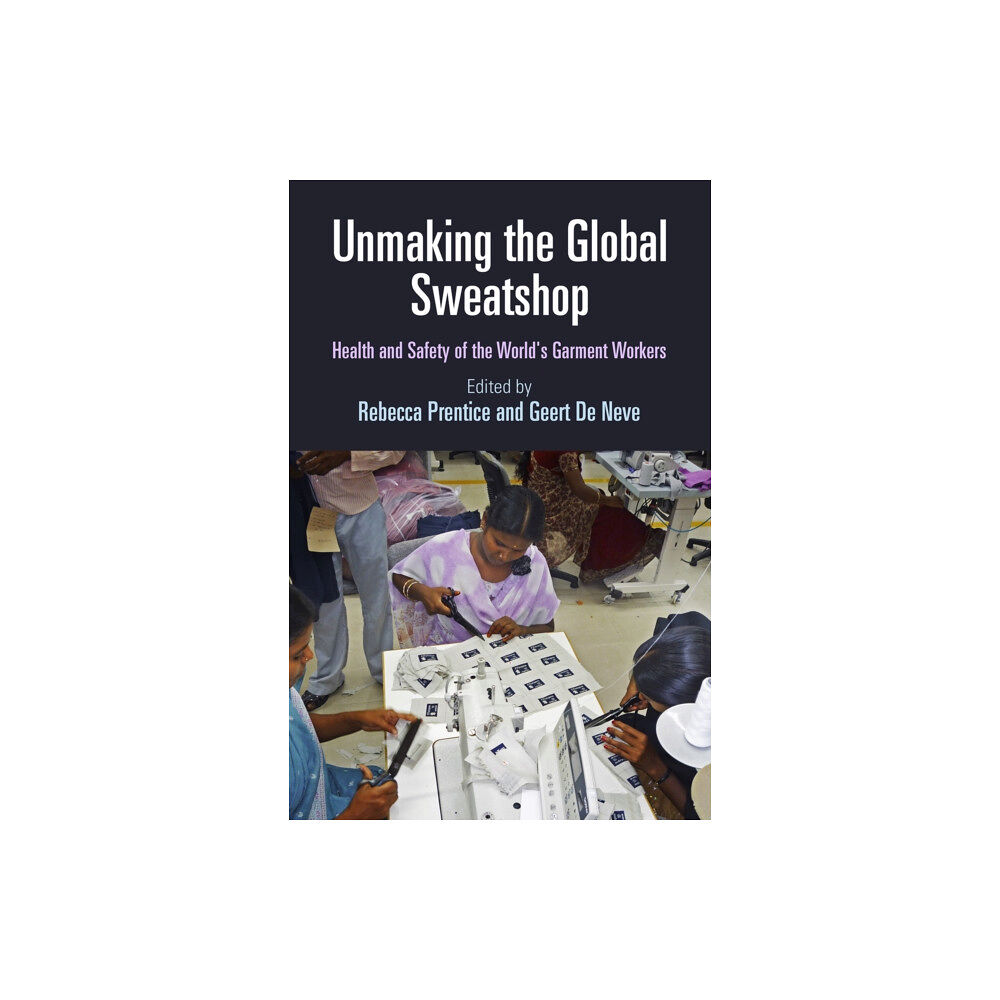- Hem
- Böcker
- Kurslitteratur
- Samhälle & Politik
- Unmaking the Global Sweatshop (häftad, eng)

Unmaking the Global Sweatshop (häftad, eng)
Anthropologists and ethnographers examine the global garment industry's impact on workers' well-beingThe 2013 collapse of Rana Plaza, an eig...
339 kr
385 kr
Bara 3 kvar
Skickas inom 2-3 vardagar
- Fri frakt
Fri frakt över 299:-
Snabb leverans
Alltid låga priser
Produktbeskrivning
Anthropologists and ethnographers examine the global garment industry's impact on workers' well-beingThe 2013 collapse of Rana Plaza, an eight-story garment factory in Savar, Bangladesh, killed over a thousand workers and injured hundreds more. This disaster exposed the brutal labor conditions of the global garment industry and revealed its failures as a competitive and self-regulating industry.
Over the past thirty years, corporations have widely adopted labor codes on health and safety, yet too often in their working lives, garment workers across the globe encounter death, work-related injuries, and unhealthy factory environments. Disasters such as Rana Plaza notwithstanding, garment workers routinely work under conditions that not only escape public notice but also undermine workers' long-term physical health, mental well-being, and the very sustainability of their employment.
Unmaking the Global Sweatshop gathers the work of leading anthropologists and ethnographers studying the global garment industry to examine the relationship between the politics of labor and initiatives to protect workers' health and safety. Contributors analyze both the labor processes required of garment workers as well as the global dynamics of outsourcing and subcontracting that produce such demands on workers' health.
The accounts contained in Unmaking the Global Sweatshop trace the histories of labor standards for garment workers in the global South; explore recent partnerships between corporate, state, and civil society actors in pursuit of accountable corporate governance; analyze a breadth of initiatives that seek to improve workers' health standards, from ethical trade projects to human rights movements; and focus on the ways in which risk, health, and safety might be differently conceptualized and regulated.
Unmaking the Global Sweatshop argues for an expansive understanding of garment workers' lived experiences that recognizes the politics of labor, human rights, the privatization and individualization of health-related responsibilities as well as the complexity of health and well-being.
Contributors: Mark Anner, Hasan Ashraf, Jennifer Bair, Jeremy Blasi, Geert De Neve, Saydia Gulrukh, Ingrid Hagen-Keith, Sandya Hewamanne, Caitrin Lynch, Alessandra Mezzadri, Patrick Neveling, Florence Palpacuer, Rebecca Prentice, Kanchana N. Ruwanpura, Nazneen Shifa, Dina M Siddiqi, Mahmudul H. Sumon.
Over the past thirty years, corporations have widely adopted labor codes on health and safety, yet too often in their working lives, garment workers across the globe encounter death, work-related injuries, and unhealthy factory environments. Disasters such as Rana Plaza notwithstanding, garment workers routinely work under conditions that not only escape public notice but also undermine workers' long-term physical health, mental well-being, and the very sustainability of their employment.
Unmaking the Global Sweatshop gathers the work of leading anthropologists and ethnographers studying the global garment industry to examine the relationship between the politics of labor and initiatives to protect workers' health and safety. Contributors analyze both the labor processes required of garment workers as well as the global dynamics of outsourcing and subcontracting that produce such demands on workers' health.
The accounts contained in Unmaking the Global Sweatshop trace the histories of labor standards for garment workers in the global South; explore recent partnerships between corporate, state, and civil society actors in pursuit of accountable corporate governance; analyze a breadth of initiatives that seek to improve workers' health standards, from ethical trade projects to human rights movements; and focus on the ways in which risk, health, and safety might be differently conceptualized and regulated.
Unmaking the Global Sweatshop argues for an expansive understanding of garment workers' lived experiences that recognizes the politics of labor, human rights, the privatization and individualization of health-related responsibilities as well as the complexity of health and well-being.
Contributors: Mark Anner, Hasan Ashraf, Jennifer Bair, Jeremy Blasi, Geert De Neve, Saydia Gulrukh, Ingrid Hagen-Keith, Sandya Hewamanne, Caitrin Lynch, Alessandra Mezzadri, Patrick Neveling, Florence Palpacuer, Rebecca Prentice, Kanchana N. Ruwanpura, Nazneen Shifa, Dina M Siddiqi, Mahmudul H. Sumon.
| Format | Häftad |
| Omfång | 304 sidor |
| Språk | Engelska |
| Förlag | University of Pennsylvania Press |
| Utgivningsdatum | 2024-10-08 |
| ISBN | 9781512826937 |
Specifikation
Böcker
- Häftad, 304, Engelska, University of Pennsylvania Press, 2024-10-08, 9781512826937
Leverans
Vi erbjuder flera smidiga leveransalternativ beroende på ditt postnummer, såsom Budbee Box, Early Bird, Instabox och DB Schenker. Vid köp över 299 kr är leveransen kostnadsfri, annars tillkommer en fraktavgift från 29 kr. Välj det alternativ som passar dig bäst för en bekväm leverans.
Betalning
Du kan betala tryggt och enkelt via Avarda med flera alternativ: Swish för snabb betalning, kortbetalning med VISA eller MasterCard, faktura med 30 dagars betalningstid, eller konto för flexibel delbetalning.
Specifikation
Böcker
- Format Häftad
- Antal sidor 304
- Språk Engelska
- Förlag University of Pennsylvania Press
- Utgivningsdatum 2024-10-08
- ISBN 9781512826937
